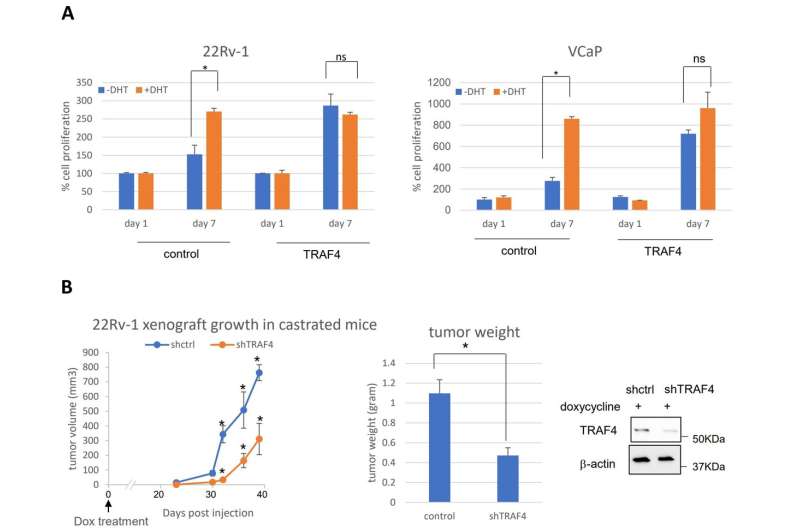This article has been reviewed according to Science X's editorial process and policies. Editors have highlighted the following attributes while ensuring the content's credibility:
fact-checked
peer-reviewed publication
trusted source
proofread
Study identifies potential treatment target for prostate cancer resistant to hormone therapy

Prostate cancer is the most-commonly diagnosed malignancy and the second leading cause of cancer death among men in the United States. In its ever-indelicate world, the stubborn disease can continue to grow even when the amount of testosterone in the body is reduced to very low levels, thus earning the clumsy name: castrate-resistant prostate cancer (CRPC). It poses a major clinical challenge as a protein called the androgen receptor (AR) remains behind as a critical player in cancer, changing its behavior in CRPCs.
Androgen-deprivation therapy, which is a treatment that reduces the levels of male hormones, is the first-line treatment for locally advanced or metastatic prostate cancer. Despite initial responses to the therapy, nearly all patients eventually develop CRPC within a few years. It is now well recognized that CRPC continues to be dependent on AR signaling.
"Understanding the triggers that cause changes in AR's activity is important for developing better treatments for CRPCs," said Ping Yi, assistant professor of biology and biochemistry, who is leading a team investigating CRPC. Yi's research is published in PNAS.
Her research team includes Ramesh Singh, Lance Lumahan and Hong Shen, Department of Molecular and Cellular Biology, Baylor College of Medicine; and Steven Nguyen, Department of Biology and Biochemistry, Center for Nuclear Receptors and Cell Signaling, University of Houston.
"We found a specific chemical modification that occurs on the AR protein in certain conditions where the levels of male hormones are reduced to castration conditions. This modification involves another protein called TRAF4, which is frequently overexpressed in advanced prostate cancers. We demonstrated that overexpression of TRAF4 leads to the conversion of androgen-sensitive prostate cancer cells into castration-resistant cells, both in lab experiments and in live samples," said Yi.
"We also found that the TRAF4 protein level is higher in androgen-insensitive lymph node carcinoma cells of the prostate."
The findings also suggest that TRAF4 is associated with promoting the spread of cancer to other parts of the body. For this research Yi examined cells of patients with metastatic cancer who had previously undergone androgen-deprivation therapy. The researchers also observed that the TRAF4 protein is higher in cancer cells that are no longer responsive to androgens compared to cells that still respond to androgens.
The researchers believe that their findings provide an important basis for identifying a group of CRPC patients who might respond well to a treatment potentially targeting the specific molecular changes caused by the AR modification, providing a possible treatment option for this group of patients.
More information: Ramesh Singh et al, TRAF4-mediated nonproteolytic ubiquitination of androgen receptor promotes castration-resistant prostate cancer, Proceedings of the National Academy of Sciences (2023). DOI: 10.1073/pnas.2218229120

















